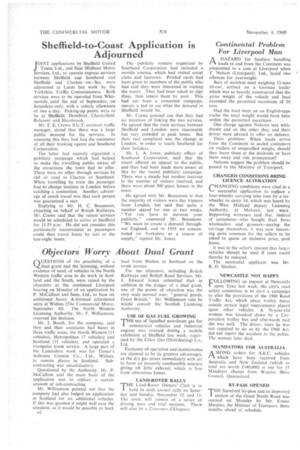Objectors Worry About Dual Grant
Page 50

If you've noticed an error in this article please click here to report it so we can fix it.
QUESTIONS of the possibility of a .dual grant and the licensing, without evidence of need, of vehicles in the North Western traffic area to do work in Scotland and the South, were raised by the objectors at the continued Liverpool hearing on Monday of an application by P. McCallum and Sons, Ltd., to base six additional heavy A-licensed articulated units at Widnes (The Commercial Motor, September 30). The North. Western Licensing Authority, Mr. F. Williamson, reserved his decision.
Mr. J. Booth, for the company, said they and their associates had bases in three traffic areas, the North Western (11 vehicles), Metropolitan (7 Vehicles) and Scotland (11 vehicles), and operated a triangular trunk service. A large part of the Lancashire work was for Turner's Asbestos Cement Co., Ltd., Widnes, to remote places in Scotland. Subcontracting was unsatisfactory.
Questioned by the Authority, Mr. P. McCallum said the main basis of the application was to replace a certain amount of sub-contracting, Mr. Williamson pointed out that the company had also lodged an application in Scotland for six additional vehicles. If this was granted it might well ease the situation, as it would be possible to back load from Widnes to Scotland on the trunk service.
For ten objectors, including British Railways and British Road Services, Mr. J. Edward Jones submitted that in addition to the danger of a dual grant, one of the points of objection was the very wide normal user: "general goods, Great Britain." Mr. Williamson said he would consult the Scottish Licensing Authority.
USE OF GAS FUEL GROWING THE use of liquefied petroleum gas for commercial vehicles and industrial engines was stressed during a mobile exhibition at Sheffield last week, organized by the Calor Gas (Distributing) Co., Ltd.
Economy of operation and maintenance are claimed to be its greatest advantages, as the dry gas mixes immediately with air to form an instantly combustible mixture giving off little exhaust, which is free from obnoxious fumes.
























































































































